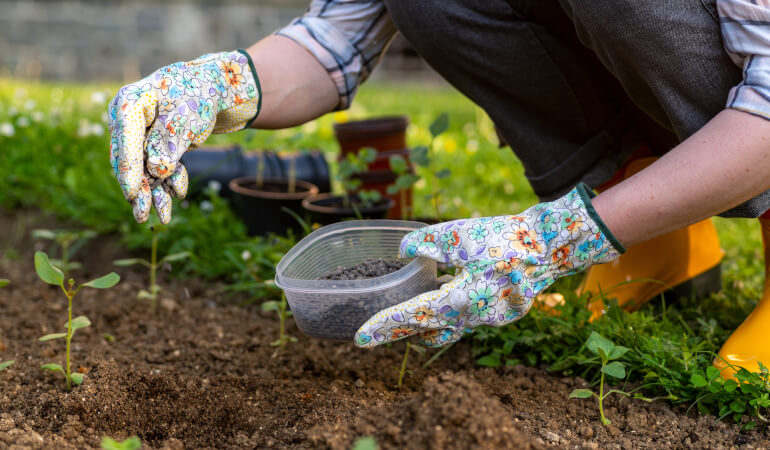
Using manure in the garden can significantly enhance soil fertility and promote the healthy growth of your plants and veggies. Before learning when is the best time to put manure in your garden, let’s get a closer look at what is actually manure and what types you can find depending on your preferences. Below we also outline what flowers like and dislike manures and provide other useful tips, so keep on reading.
Table of Contents
What is manure?
Manure is a natural and nutrient-rich substance that enhances soil fertility and improves garden plant growth. It is a valuable organic material derived from the waste products of animals, such as horses, chickens, sheep or green waste. Manure becomes a valuable source of essential nutrients when properly composted. They include nitrogen, phosphorus, and potassium, crucial for the healthy development of plants.
Types of manure
Various types of manure can be used in gardens in the UK. Each type has its unique nutrient composition and benefits:
Animal manure
- Horse manure: Horse manure is widely available and is often considered one of the best types of manure for gardens. It has a balanced nutrient profile and is less likely to contain weed seeds than other manures. However, composting the manure is an important step before you apply it anywhere in the garden. This will guarantee the elimination of any potential pathogens.
- Chicken manure: Chicken manure is rich in nitrogen, phosphorus, and potassium. This is exactly what makes it a plant fertiliser to consider. However, you should compost it well to avoid burning plants due to its high nitrogen content. Fresh chicken manure can be too potent for direct application and may harm plant roots.
- Sheep manure: Sheep manure is another beneficial type of manure that is commonly used in gardening. It has a lower nutrient content compared to horse or chicken manure but still provides valuable organic matter and nutrients to the soil. Composting sheep manure helps break down its fibrous structure and releases nutrients more efficiently.
Green manure
Green manure refers to specific plant species, such as clover, vetch, or alfalfa, explicitly grown to improve soil fertility. Green manure crops are sown and then incorporated into the soil while still green and actively growing. These plants are typically grown as cover crops during fallow periods or between crop rotations.
Green manure plants add organic matter to the soil, improve the soil’s structure, and reduce weed growth. Once tilled into the soil, green manure decomposes, releasing nutrients that become available to subsequent plantings.
Composted manure
Compost manure results from composting animal manure, plant matter, and other organic materials. It is a nutrient-rich, well-decomposed manure that can significantly improve the soil’s structure, fertility, and moisture retention.
Compost manure contains a balanced blend of nitrogen, phosphorus, and various other elements necessary for healthy plant growth. It also enhances soil microbial activity, which aids in nutrient cycling and disease suppression. Compost manure can be added to the garden any time during the year, providing a slow-release source of nutrients to plants.
When should you put manure in the garden?
The timing of applying manure to a garden is crucial to ensure optimal plant growth and prevent any potential issues. Generally, the best time to spread manure in the UK is autumn. Here’s why:
- Crop rotation: Many gardeners follow crop rotation practices, where different plant families are grown in specific areas yearly. Applying manure in autumn allows it to break down and integrate into the soil before the next planting season, providing sufficient time for its nutrients to become available to the plants.
- Overwintering: Spreading manure in autumn allows it to benefit from the natural processes that occur during winter. The cold weather and moisture help break down the manure, releasing nutrients and improving its quality.
- Moisture retention: Spreading manure in autumn helps the soil retain moisture during the winter. The organic matter in manure acts as a natural mulch, protecting the soil from erosion caused by heavy rains and keeping it moist for future plantings.
- Soil preparation: Applying manure in autumn gives it plenty of time to decompose and enrich the soil structure. It improves soil fertility, drainage, and aeration, providing an optimal environment for plant roots to develop and thrive.
As animal manure is one of the most used in the UK, we will look closer at when to put horse, chicken or sheep manure.
The timing for putting animal manure in your garden can vary depending on the specific type of manure and your gardening goals. However, the general recommendations are as follows:
When to add fresh animal manure to the garden?
On the other hand, fresh animal manure should be applied with caution due to its higher nutrient concentration and potential for burning plants. It is generally best to avoid applying fresh animal manure directly onto your garden beds.
Rather, before applying new animal manure to your garden, it is advised to compost it for at least six months to up to a year. Composting helps break down the manure, eliminate potential pathogens, and stabilise the nutrient content.
Remember to adjust the amount of animal manure applied based on the specific needs of your plants and the composition of your soil. Do a soil test to determine the nutrient levels and make informed decisions about the appropriate quantity of manure to apply. Additionally, following any specific recommendations or guidelines provided by the manufacturer or local agricultural extension services is essential.
When to apply composted animal manure?
If you have composted animal manure, it can be added to your garden anytime throughout the year. Composted manure has undergone decomposition, stabilising the nutrients and reducing the risk of burning plant roots. You can incorporate composted animal manure into the soil before planting or use it as a top dressing around existing plants.
Which plants like manure?
Many plants benefit from the addition of manure to the soil. Here are some examples of plants that mainly thrive when manure is used:
- Vegetables: Most vegetables, including tomatoes, cucumbers, peppers, and leafy greens, respond well to the nutrient-rich properties of manure. It helps promote healthy foliage growth, robust root development, and abundant harvests.
- Fruit trees: Fruit trees, such as apple, pear, and cherry trees, greatly benefit from the nutrient boost provided by manure. It encourages healthy fruit production and overall tree vigour.
- Flowers: Many flower varieties, such as roses, dahlias, and marigolds, flourish in manure-rich soil. It enhances their blooming capabilities, strengthens stems, and improves their overall health.
- Herbs: Herbs like basil, thyme, and parsley thrive in soil supplemented with manure. It helps intensify their flavours and aromas while promoting lush foliage growth.
Which plants DON’T like manure?
While manure benefits garden plants, certain plants may not tolerate or prefer manure. Here are some examples of plants that are not typically fond of manure:
Plants that thrive in acidic soil
Some plants, such as rhododendrons, azaleas, blueberries, and camellias, thrive in acidic soil conditions. Manure tends to increase the soil’s pH level, making it less suitable for these plants. Instead of manure, it is advisable to use organic compost or other suitable soil amendments that do not affect the soil’s acidity.
Root crops
Root crops, including carrots, potatoes, beets, and radishes, prefer a light and loose soil structure. Excessive use of manure can lead to misshapen roots and affect the quality of the harvest. While a moderate amount of well-composted manure can benefit root crops, it is important not to overdo it to avoid compacted or overly rich soil.
Native wildflowers
Native wildflowers, particularly those adapted to low-nutrient soils, may not fare well with excessive nutrient levels provided by manure. These plants have evolved in specific environments and are adapted to nutrient-poor conditions. Adding too much manure can promote vigorous growth and imbalance the ecosystem, potentially favouring aggressive weeds over delicate native wildflowers.
Sensitive seedlings
Some seedlings, especially those with delicate root systems, may be sensitive to fresh manure’s high nutrient levels or heat. Direct contact with fresh manure can cause root burn or kill young seedlings. It is advisable to use composted manure or allow fresh manure to age and decompose before using it near sensitive seedlings.
Need a professional gardener?
Enter your postcode to view our rates and availability in your area.
For questions about the services we offer visit our main site
When should you NOT use manure?
Although manure is generally beneficial for gardens, there are certain situations when its use should be avoided. We already mentioned most of them, but we will sum them up once again here:
- When you have only fresh manure: As explained before, using fresh manure directly on plants can harm them. The high nitrogen levels could burn plant roots, causing damage or death. It is crucial to compost manure thoroughly before applying it to the garden to eliminate potential pathogens and allow the nutrients to stabilise.
- When you are dealing with a certain type of root crops: Root crops, such as carrots, potatoes, and beets, prefer a light and loose soil structure. Excessive use of manure can cause misshapen roots and affect the quality of the harvest. It is advisable to limit the use of manure when cultivating root crops.
- When you have plants that prefer acidic soil: Some plants prefer acidic soil conditions. Manure tends to increase the pH level of the soil, which can change the health of such plants for the worse. Instead, using organic compost or other suitable soil amendments is recommended for such plants.
Takeaways
By understanding when and how to use manure effectively, gardeners in the UK can maximise the potential of their gardens and enjoy bountiful harvests year after year.
- Using manure in the garden can significantly enhance soil fertility and promote healthy plant growth.
- Different types of manure, such as horse, chicken, and sheep manure, offer various nutrient profiles and benefits.
- Spreading manure during autumn allows it to decompose, integrate with the soil, and release nutrients before the next planting season.
- Adding manure to the soil benefits most vegetables, fruit trees, flowers, and herbs.
- Be cautious when using fresh manure and cultivating root crops or certain types of plants.



